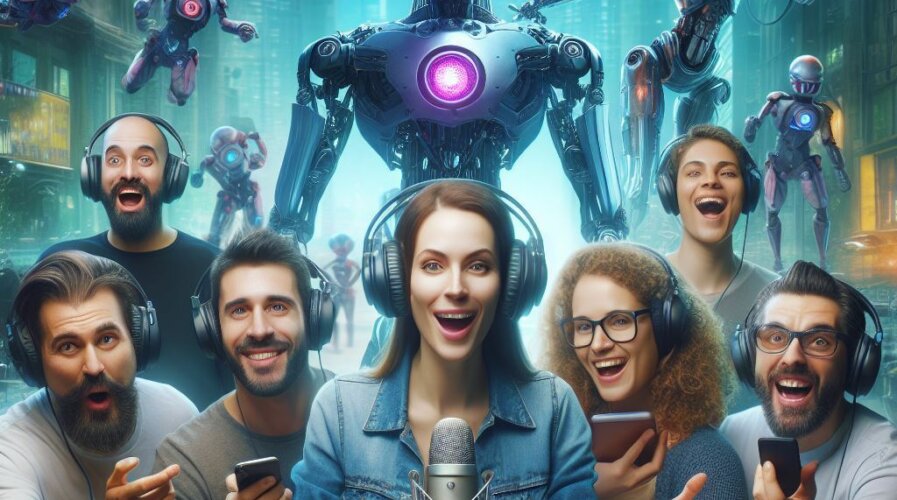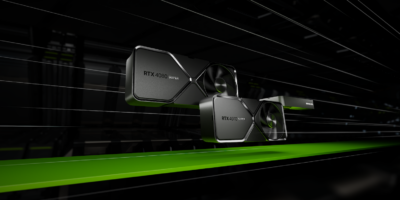
AI technology stirs controversy among gaming voice actors (Generated with AI).
Gaming voice actors rally against the rise of AI technology
- Gaming voice actors oppose of the growing role of AI in their industry.
- SAG-AFTRA’s AI voice deal faces backlash from voice actors.
- AI voice acting in games like Naruto x Boruto sparks ethical debates.
In the rapidly evolving gaming space, a new controversy has emerged: prominent voice actors are voicing their displeasure over a significant yet opaque agreement concerning the use of AI-generated voices. This technology, which has the potential to revolutionize voice acting in games, is at the center of a heated debate between actors and industry stakeholders.
This deal, forged between the US actors’ union SAG-AFTRA and AI company Replica Studios, aims to ensure “fully informed consent and fair compensation” for union members.
However, many voice artists, already wary of AI replacing their roles, have vehemently opposed the agreement. According to the BBC, SAG-AFTRA communicated to its members via email that the deal was negotiated by a committee comprising actors with extensive experience in gaming. The union emphasized that the contract was designed to cater specifically to voice actors, offering terms for informed consent and appropriate compensation.
SAG-AFTRA’s strike and AI
The roots of this controversy can be traced back to SAG-AFTRA’s prolonged 2023 strike, where the focus was on advocating for protections against AI usage by film and television studios. This historical context is crucial in understanding why the current agreement has sparked a strong reaction among voice actors.
Numerous voice actors view this new deal as contradictory to the goals of that strike. Sunil Malhotra, known for his work in Fallout and Mortal Kombat, mentioned he had participated in the strike last year to preserve his profession, not to facilitate the use of his AI-generated voice.
SAG-AFTRA, in a blog post announcing the deal, stated that it was ratified by members of the union’s voiceover community who are impacted by this technology. The union’s chief negotiator, Duncan Crabtree-Ireland, highlighted the importance of protecting voice talent rights, especially with game studios increasingly exploring AI for efficiency. He asserted that the agreement secures informed consent and fair compensation for the usage of members’ voices and performances.

What will happen to gaming voice actors in the future? (Source – X).
Despite these assurances, notable voice actors have strongly criticized the deal. Steve Blum, recognized by Guinness as a prolific video game voice actor, stated that he was unaware of anyone who had approved the agreement. According to SAG-AFTRA, the agreement details the terms for using AI-generated voices in video games, which Replica Studios can license for gaming and other media. It requires the AI firm to obtain consent from actors before using their voice likenesses and allows actors to refuse perpetual usage of their voices without consent.
This agreement has been met with dissatisfaction from various performers. Andrew Russell, a voice actor for World of Warcraft, labeled it “garbage,” while Shelby Young, who will voice Yuko in Persona 3: Reload, expressed disappointment in the union. The criticism extends beyond gaming, with Joshua Seth from Digimon and audiobook narrator Paige Reisenfeld also voicing discontent. Veronica Taylor, the voice of Ash in Pokemon, questioned how the deal was finalized without a vote.
In contrast, SAG-AFTRA president Fran Drescher praised the deal as a positive example of AI integration. At the same time, Replica Studios CEO Shreya Nivas described it as an “ethical approach” to AI, highlighting the potential benefits for significant studios in accessing AI voice technology with the assurance of fair talent compensation.
AI technology in gaming: A case study
The controversy extends beyond union agreements to actual game releases. Take, for example, the recently released Naruto x Boruto Ultimate Ninja Storm Connections. This game has become a focal point of debate due to allegations that generative AI tools were used for its English dub voice lines. Such technology, while innovative, raises ethical questions about authenticity and the preservation of artistic integrity in voice acting.
These claims, unproven as of now, have yet to receive a response from publisher Bandai Namco and developer CyberConnect2, igniting significant discussion within the gaming community.
Players began voicing concerns on social media shortly after the game’s November 17 release, pointing out several unnatural and poorly executed lines in the English dub. This led to speculation about AI involvement, especially after recent controversies surrounding AI voices in other games, like the multiplayer shooter The Finals.
The controversy intensified with input from voice actors associated with Ultimate Ninja Storm Connections. Maile Flanagan, the English voice of Naruto, responded to a fan’s query on Twitter, insisting she did not deliver a contentious line in the manner it was presented in the game. While Flanagan refrained from directly accusing the developers of using AI, she was adamant about her non-involvement in the line’s delivery. This situation reflects a broader industry debate, with prominent actors like Jennifer Hale and David Hayter criticizing AI voice generators in gaming.
Michael Schwalbe, another voice actor from the game, revealed on Twitter that he had analyzed suspicious voice clips using AI-detection software, which purportedly found a mix of human and AI elements. However, the accuracy of such AI detection tools remains a matter of debate.
If Bandai Namco did use generative AI tools in this context, it could lead to significant backlash, particularly as Schwalbe highlights the unionized nature of the project, which typically prohibits generative AI use. This issue was a catalyst for recent considerations of strike actions by video game voice actors in solidarity with Hollywood actors and writers.
Bandai Namco has since released a statement addressing the AI allegations in Ultimate Ninja Storm Connections, clarifying that the controversial voice lines were not AI-generated but rather the result of inconsistencies in the editing and mastering process. The company expressed regret for any concerns raised and committed to fixing the disputed lines through an upcoming patch.
This incident adds to the growing list of AI-related disputes in the gaming industry, with increasing prevalence and mainstream adoption of generative AI tools. The ethical and exploitative use of these tools continues to be a contentious topic, raising questions about future commitments from major studios to mitigate potential harm.
In a separate but related incident, Ned Luke, known for his role as Michael in Grand Theft Auto 5, called out a chatbot using his voice without permission. Based on his character from GTA 5, the chatbot was removed following Luke’s criticism of the voice generator as “garbage” on X. Luke’s frustration echoes the concerns of many gaming actors facing similar unauthorized use of their voices.
The chatbot creator, WAME, acknowledged the issue but stopped short of apologizing to Luke. WAME expressed understanding and concern in a statement, committing to ethical AI practices. This unfolding scenario underscores the complex challenges voice actors face in the gaming industry amid rapid advancements in AI technology.
Ethical considerations and future directions
It’s a clear indicator that as we move forward, the industry must navigate a delicate balance between embracing technological innovation and preserving the irreplaceable human element in voice acting. The need for comprehensive ethical considerations, transparent agreements, and robust legal protections is more pressing than ever in this rapidly evolving digital landscape.
READ MORE
- Safer Automation: How Sophic and Firmus Succeeded in Malaysia with MDEC’s Support
- Privilege granted, not gained: Intelligent authorization for enhanced infrastructure productivity
- Low-Code produces the Proof-of-Possibilities
- New Wearables Enable Staff to Work Faster and Safer
- Experts weigh in on Oracle’s departure from adland


